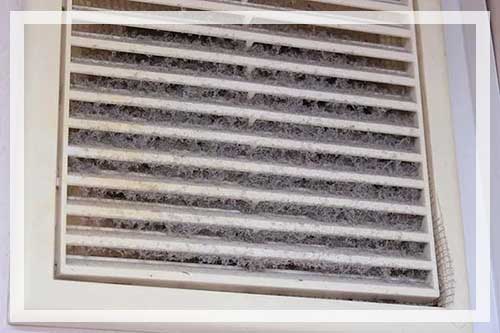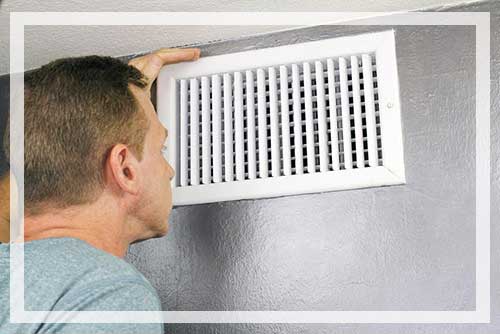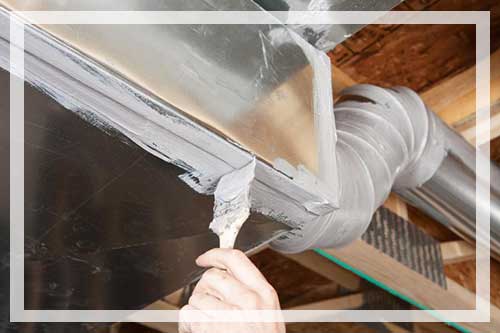Do you feel like your AC system isn’t running as efficiently as it should? If so, you’re not alone. Many homeowners don’t recognize the signs that they need AC duct repair, leaving them vulnerable to costly repairs and energy bills.
Let’s talk about the eight common signs of air conditioner duct repair that can help you identify when a professional is needed and how to go about selecting one.
We’ll also explore various methods of repairing air ducts and provide safety tips during and after the repair process. Finally, we’ll discuss the benefits of regular maintenance of your AC system.
Common Signs Of An AC Duct Repair
The most important step in AC duct repair is first being able to identify the warning signs that something needs to be fixed. Oftentimes, AC systems are ignored until they break down completely, which can result in costly repairs and energy bills. Fortunately, there are some common indicators of AC duct repair that you can look out for so that you can act quickly and save money.
The most common AC duct repair signs are dusty vents, strange noises coming from the AC, poor airflow throughout your home, a moldy smell coming from the AC unit, increasing energy bills, visible duct leaks, old age of your duct system, and hot or cold spots in your home.
1. Dusty vents

Dusty AC vents indicate that the air filters in your air conditioning system are clogged or dirty. When your air filters are dirty, they cannot effectively filter out dust, dirt, and other particles from the air, which can lead to an accumulation of these particles in your AC system.
As a result, the air that comes out of your AC vents will be filled with these particles, causing the vents to become dusty.
When your AC system is not able to filter out these particles effectively, it can cause a number of issues. For example, it can lead to reduced airflow, which can cause your AC to work harder and less efficiently. It can also cause the evaporator coil in your AC system to become dirty, which can lead to reduced cooling capacity and higher energy bills. In addition, a dirty AC system can cause indoor air pollution, which can lead to health problems for you and your family.
2. Strange Noises Coming From The AC
Strange noises can be a sign that there may be issues with the internal components of your AC system. AC systems are designed to operate quietly, so any unusual or loud noises are a clear indication that something is wrong.
Some common examples of strange noises that may come from your AC system include grinding, rattling, squealing, hissing, or buzzing sounds. These noises can be caused by a variety of issues such as loose or damaged parts, worn-out bearings, refrigerant leaks, or a malfunctioning compressor.
Ignoring these noises can cause further damage to your AC system, which may result in more costly repairs or even the need for a complete system replacement.
For instance, a grinding noise coming from your AC system is a sign that there is an issue with the blower fan, which can cause damage to other parts of your AC system.
A hissing or buzzing noise may indicate a refrigerant leak, which can lead to reduced cooling capacity and increased energy bills.
Squealing noises can be caused by a damaged belt, which can cause further damage to other parts of the AC system if not addressed in time.
3. Poor Airflow Throughout Your Home

Poor airflow can be caused by a number of issues, including clogged air filters, dirty evaporator coils, blocked ductwork, or malfunctioning motors or fans.
When your AC system is not able to circulate air properly, it can lead to a range of problems. For example, it can cause certain areas of your home to be too hot or too cold, even when your AC is running. This can result in discomfort for you and your family, as well as higher energy bills as your AC system works harder to compensate for the poor airflow.
In addition, poor airflow can also lead to reduced air quality, as the AC system is not able to filter and circulate air effectively. This can lead to an accumulation of dust, mold, and other pollutants in your home, which can lead to allergies, respiratory issues, and other health problems.
4. A Moldy Smell Coming From The AC Unit
The mold smell that comes from the AC unit can be a sign that your AC needs repair throughout your home because it indicates the presence of mold or other harmful microorganisms in your AC system. Mold can grow inside your AC system due to the high humidity levels and the presence of organic matter, such as dust or debris.
If you notice a musty or moldy smell coming from your AC unit, it is important to have it inspected and repaired by a professional HVAC technician. If left untreated, mold growth can cause a range of health problems, especially for people with allergies or respiratory issues. In addition, mold can cause damage to your AC system and reduce its efficiency.
5. Increasing Energy Bills
As your AC system becomes less efficient, it has to work harder and consume more energy to maintain the same level of cooling in your home. This results in higher energy bills that can continue to increase over time.
Several issues can cause your AC system to become less efficient, such as clogged air filters, refrigerant leaks, malfunctioning motors or fans, dirty evaporator or condenser coils, or blocked ductwork. All of these issues can cause your AC system to work harder than it should, which not only increases your energy bills but also shortens the lifespan of your AC system and reduces its cooling capacity.
6. Visible Duct Leaks

Duct leaks occur when there are gaps or cracks in the ductwork that allow cool air to escape before it reaches its intended destination, resulting in reduced cooling efficiency, increased energy bills, and a lack of comfort in your home.
When you have visible duct leaks, you may notice hot or cold spots in different areas of your home, indicating that the air is not being distributed evenly. In addition, you may notice an increase in your energy bills as your AC system has to work harder to compensate for the loss of cooling efficiency.
7. Old Age Of Your AC System
Over time, an AC system can become less efficient and may develop mechanical problems due to wear and tear. As the system ages, it may not be able to cool your home as effectively as it once did. This can result in reduced comfort levels and higher energy bills.
Furthermore, an older AC system may also be more prone to breakdowns and require more frequent repairs. This can be particularly true if the system has not been properly maintained over the years.
8. Hot Or Cold Spots In Your Home
If you notice that some rooms in your home are significantly warmer or cooler than others, it may indicate that your AC system is not distributing cool air evenly throughout your home.
There are several reasons why this may be happening, including:
- Clogged air filters: A dirty or clogged air filter can restrict airflow, which can result in reduced cooling and uneven temperatures throughout your home.
- Ductwork issues: Leaks or blockages in your ductwork can prevent cool air from reaching certain areas of your home, resulting in hot or cold spots.
- Improperly sized AC system: If your AC system is too small for your home, it may struggle to cool all areas evenly.
- Malfunctioning thermostat: If your thermostat is not functioning properly, it may not accurately sense the temperature in your home and may not signal the AC system to turn on or off when needed.
Factors To Consider When Selecting An AC Duct Repair Contractor
When selecting a contractor for AC duct repair, it is important to consider a few factors to ensure that the job is done properly and the AC system is back in optimal condition.
Experience
Look for contractors who have experience working on AC systems similar to yours. This will ensure that they know how to properly diagnose any issues you may have and provide effective solutions.
Licensing and Insurance
Make sure that the contractor is licensed and insured in case something goes wrong during the repair process.
Customer Reviews
It is important to check their customer reviews or ask for references from past clients so you can be sure that they provide quality service.
Exploring Various Methods Of Repairing Air Ducts
There are numerous methods available to repair AC ducts, including sealing leaks, replacing sections of damaged ducts, and insulating ducts to help maintain the temperature of the air.
Sealing AC Duct Leaks
Sealing AC duct leaks is one of the most common AC duct repair methods. This involves using mastic sealant, a special adhesive that creates a strong bond and seals any cracks or gaps in the AC ducts to prevent air leakage.
Replacing Damaged AC Ductwork
If sections of your AC ducts are severely damaged, it may be necessary to replace those sections with new AC ducts. This will help ensure that your AC system is able to effectively distribute cooled air throughout your home.
Insulating AC Ducts
Insulating AC ducts can help maintain the temperature of the air passing through them and reduce energy loss due to leakage. This can help improve the efficiency of your AC system and reduce energy bills.
Safety Tips for HVAC Duct Repair
When performing HVAC duct repair, it is important to keep safety in mind. Make sure that all electrical components are shut off before beginning any repair work and wear protective gear such as gloves and a face mask.
It is also important to be aware of your surroundings and stay away from any moving parts or sharp edges.
